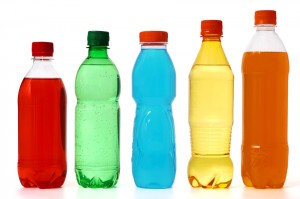Alzheimer’s dementia and cancer—straight from the vending machine
 By Marc S. Micozzi, M.D., Ph.D.
By Marc S. Micozzi, M.D., Ph.D.
By now, it’s common knowledge that soda can cause weight gain and contribute to Type II diabetes. But research also shows drinking soda causes many other far-reaching health problems. Including major and profound brain changes.
In fact, scientists at Macquarie University in Australia recently found that consuming sugary drinks causes changes in the brain similar to those seen in Alzheimer’s dementia. In this lab study, scientists fed rats sugary water similar to sugar concentrations found in soda. Just 26 days later, they found profound changes in areas of the brain associated with memory. In addition, they found alterations in 290 different brain proteins. As well as long-lasting behavioral changes, including hyperactivity.
Research also shows soda can cause osteoporosis. You see, phosphoric acid, which gives soda its tangy taste, leaches calcium from bones. In fact, researchers from Tufts University in Boston found that women who drink soda had lower bone density, which put them at greater risk for hip fractures at older ages. Even among teen girls, who are the most poorly nourished segment of the population, the researchers found a strong link between soda and bone fractures.
Numerous studies also link soda to cancer. These studies shouldn’t surprise anyone who knows their chemistry. You see, when sodium benzoate (used in sodas) mixes with vitamin C it creates benzene, a chemical solvent recognized as a human carcinogen.
Here again, you don’t have to drink much soda to increase your risk…
In fact, a Chinese study found that just two or more soft drinks per week doubles the risk of the deadly pancreatic cancer. Soda is particularly hard on your pancreas because it introduces high levels of sugar rapidly into the blood stream. As a result, the pancreas must produce extra insulin, which can lead to the development and/or promotion of cancer cells. (Of course, Metformin, the Type II diabetes drug based on an ancient herbal remedy, reduces the risk of pancreatic cancer up to five-fold, probably by reducing unhealthy, excess stimulation of pancreatic cells.)
In yet another study, researchers linked soda to endometrial cancer in women. They followed 23,000 postmenopausal women for 25 years. And found that women who drank the most soda or other sugary drinks per week increased their risk of endometrial cancer by a whopping 78 percent.
Soda also appears to affect your heart health…
In a recent study, researchers found that drinking a single, 12-ounce soda per day increased the risk of having a heart attack—and dying from it—by 20 percent. In another study at the University of Colorado Health Sciences Center, researchers found that a diet high in high-fructose corn syrup (HFCS) increases high blood pressure by risk up to 87 percent.
Of course, drinking soda also causes tooth decay, especially when the raw sugar washes over your teeth with every sip. In addition, the phosphoric acid and/or citric acid in soda changes the pH (acid/balance) of saliva. This condition can cause tooth enamel to erode. In fact, according to the Academy of General Dentistry, drinking large amounts of soda could be as damaging to your teeth as methamphetamine or crack cocaine.
Bottom line?
Avoid sodas altogether. For real natural hydration, stick with South African rooibos, a water-soluble powdered extract that you can add to any beverage, hot or cold. I recommend Red Joe brand water-soluble rooibos powdered extract, which I helped formulate.
******
Marc S. Micozzi, M.D., Ph.D. was the founding editor-in-chief of the first US journal in Complementary and Alternative Medicine and organized and edited the first US textbook in the field, Fundamentals of Complementary & Integrative Medicine in 1996. He has published nearly 300 articles in medical literature and is the author or editor of over 25 books. Dr. Micozzi served as Senior Investigator of cancer prevention at the National Cancer Institute, where he published the original research on diet, nutrition, and chronic disease. He continued this line of research as the Associate Director of the Armed Forces Institute of Pathology and Director of the National Museum of Health and Medicine.
In recent years, Dr. Micozzi has served as the Founding Director of the Policy Institute for Integrative Medicine in Bethesda, MD, working to educate policy makers, the health professions, and the general public about the opportunities for integrative medicine and the need for clean, clear science within our modern medical establishment. Dr. Micozzi writes a monthly newsletter called Insiders’ Cures as well as a free e-letter called The Daily Dispatch
SOURCES:
“Colas, but not other carbonated beverages, are associated with low bone mineral density in older women: The Framingham Osteoporosis Study,” Am J Clin Nutr. 2006; 84(4): 936-942
“Soft drink and juice consumption and risk of pancreatic cancer: the Singapore Chinese Health Study,” Cancer Epidemiol Biomarkers Prev. 2010;19(2):447-455
“Sugar-sweetened beverage intake and the risk of type I and type II endometrial cancer among postmenopausal women,” Cancer Epidemiol Biomarkers Prev. 2013; 22(12): 2384-94
“Sweetened beverage consumption, incident coronary heart disease, and biomarkers of risk in men,” Circulation 2012;125:1735-41, S1.
“High fructose intake from added sugars: An independent association with hypertension,” Science Daily (www.sciencedaily.com) 11/11/09
“Sugary drinks tinker with vital proteins in the brain,” New Scientist (www.newscientist.com) 11/14/2013